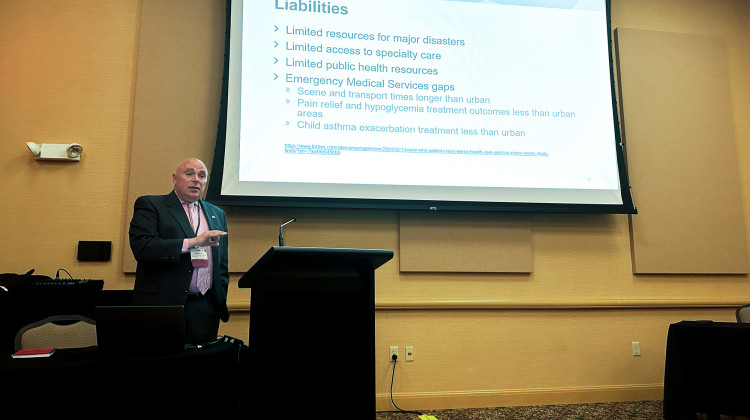
Medxcel's Scott Cormier said collaboration can help strengthen emergency preparedness for critical health care infrastructure.
Abigail Ruhman / IPB NewsWhen a community is facing a disaster, health care facilities can become a vital part of the response. Rural hospitals can face unique challenges in those moments — but also have some advantages over larger hospitals in cities.
Rural hospitals may not have the same resources available if they encounter a disaster. For example, they may have fewer people to staff the facility and fewer options to divert people if they can’t provide care.
Scott Cormier oversees emergency management at Medxcel, a facility services provider that exclusively focuses on health care. He said rural hospitals have to adapt using the resources they have. One of the advantages he’s seen in rural hospitals is a higher sense of community.
“The people in the community that work in the hospitals, that come to the hospital, that support the hospital, they know all they all know each other,” Cormier said. “And that makes a huge difference.”
READ MORE: How the public health system overhaul came to be – and what’s still left to do
Join the conversation and sign up for the Indiana Two-Way. Text "Indiana" to 765-275-1120. Your comments and questions in response to our weekly text help us find the answers you need on statewide issues and the election, including our project Civically, Indiana.
Cormier said collaboration can help strengthen emergency preparedness for critical health care infrastructure. For example, rural hospitals can improve their response plans by working with other hospitals or health care providers in their area.
“You can manage a couple hospitals during one event and train together and buy your equipment together, and apply for your grants together so that you can truly be collaborative,” Cormier said.
Cormier said this approach can help hospitals feel less pressure when developing and implementing their plans. He also said hospitals in rural areas can work with transportation and communication companies in their area to strengthen their emergency response plans in the future.
Abigail is our health reporter. Contact them at aruhman@wboi.org.
 DONATE
DONATE






 Support WFYI. We can't do it without you.
Support WFYI. We can't do it without you.